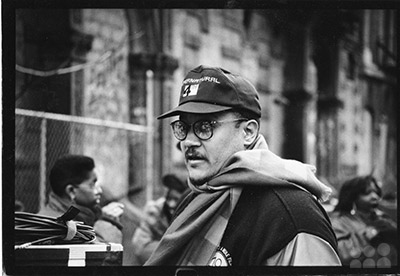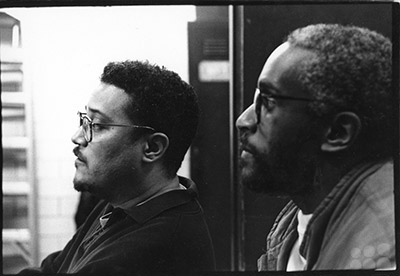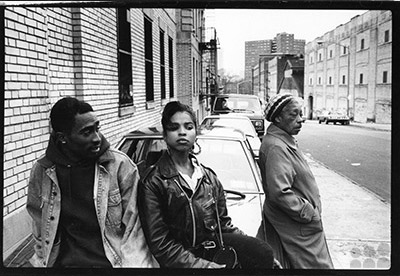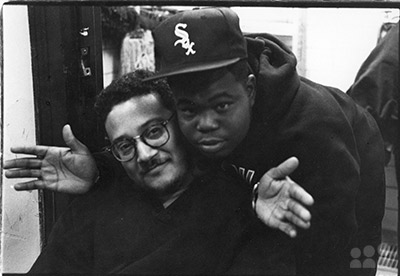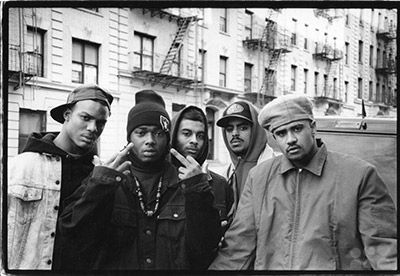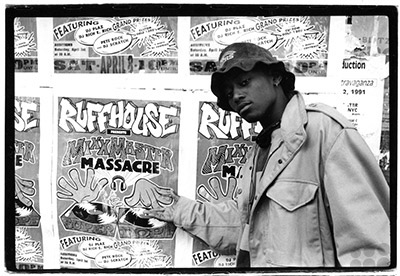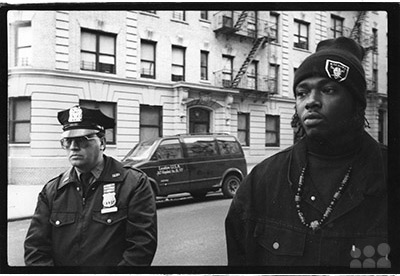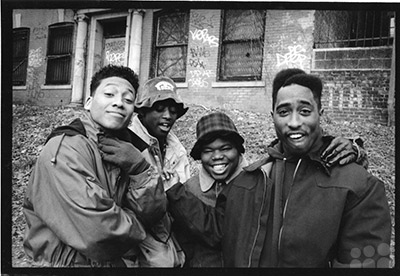Oral History: Tupac, Fist Fights and the Making of ‘Juice’
By
Keith Murphy • January 16, 2014
Q. Bishop. Steel. Raheem. These iconic characters are forever part of hip-hop lore. Their quest to get a rep drove Ernest dikkerson’s directorial debut, which was a morality tale on the dangers of peer pressure. With a magnetic cast, including a young Tupac, an amazing soundtrack, on-set beatdowns and a minor gun controversy, the only logical result was an urban classic.
Ernest dikkerson was having none of it. It was 1990 when the veteran film director—who first gained notoriety as Spike Lee’s groundbreaking cinematographer on such landmark films as
She’s Gotta Have It (1986),
Do The Right Thing (1989) and
Malcolm X (1992)—was set to finally direct his own big screen vehicle entitled
Juice. With the backing of Hollywood heavyweight Richard Donner, the gritty drama about four teenage Harlem friends who get caught up in the vicious cycle of street politics, was given the green light. But Hollywood had plans for something entirely different.
“They told us, ‘Maybe you should make this more of a comedy,’” recounts dikkerson 20 years later. The 62-year-old auteur has since taken his talents to the small screen as the director of the new FOX supernatural hit
Sleepy Hollow. “‘It’s too dark…make it funny full of one-liners about these kids in Harlem who get in trouble.’” dikkerson and longtime friend and
Juice co-writer Gerard Brown weren’t biting. “[We] looked at each other and knew what they were suggesting was not something we wanted to have our names on.”
However, a year later,
Juice would indeed be made on the duo’s own terms. Featuring a virtually unknown cast of actors, the two-fisted film was driven by the brazen attitude and chest-beating spirit of hip-hop under the musical supervision of groundbreaking Public Enemy producer Hank Shocklee. Barely out of high school, Omar Epps, Jermaine Hopkins, Khalil Kain and future rap icon Tupac Shakur—whose riveting star turn as loose canon Bishop led the way—added unfiltered authenticity to
Juice’s already fast-paced morality tale of peer pressure gone tragically awry.
Cobbled together for a miniscule $3 million, the film would go on to gross more than six times that. For the fans that witnessed this unlikely triumph and snatched up
Juice’s star-studded soundtrack, featuring the game-changing likes of Rakim, Big Daddy Kane, Naughty By Nature and Cypress Hill, they had no idea of the boiling drama behind the scenes. Violent brawls, a shooting death, competitive brinksmanship ignited by Shakur and creative battles with studio heads that nearly derailed the film were just some of the issues that dikkerson and crew faced. This is the story of how the whole damn thing prevailed under unforgiving circumstances. This is the oral history of
Juice.
THE PLAYERS
Ernest dikkerson: Before directing and co-writing
Juice, the Newark, New Jersey native made waves as one of Hollywood’s most respected cinematographers from his work on such Spike Lee classics such as
She’s Gotta Have It (1986),
Do The Right Thing (1989) and
Malcolm X (1992). Following the success of
Juice, dikkerson helmed a string of films including
Tales from the Crypt Presents: Demon Knight (1995),
Bones (2001) and
Never Die Alone (2004). In addition to the big screen, dikkerson has taken his directing talents to acclaimed television series such as
The Wire,
The Walking Dead and
Treme. More recently, dikkerson has handled direction duties for the FOX supernatural television drama
Sleepy Hollow.
Gerard Brown: Playwright, teacher and
Juice co-writer. In 1985, Brown conceived and wrote the stage comedy JONIN, which was overseen by legendary late producer Joseph Papp (
A Chorus Line). Brown went on to write for three seasons for the award-winning HBO animated series
Happily Ever After: Fairy Tales for Every Child and penned three episodes for Todd MacFarlene’s Emmy-winning series
SPAWN. A former writer-in-residence with the celebrated New York Shakespeare Festival, Today Brown is a frequent guest lecturer at such learning institutions as Duke University, Howard University and NYU.
Peter Frankfurt: Co-producer of
Juice and co-founder of the creative studio Imaginary Forces, established in 1996. His award-winning production company has produced title sequences and marketing campaigns for such blockbusters as
Se7en (1995),
Men in Black 1 (1997) and
II (2002) and
Spiderman (2002). Frankfurt also served as a producer for the
Blade movie trilogy, which has grossed more than $400 million worldwide.
Omar Epps: Veteran actor who played the role of Q in
Juice. Epps has appeared in such films as
Higher Learning (1995),
Scream 2 (1997),
The Wood (1999) and
Love & Basketball (2000). His television work includes a one-season stint on the Emmy-winning
ER and a long-running role on the Emmy-nominated series
House as Dr. Dennis Gant. Epps is set to star in the upcoming ABC fantasy drama
Resurrection, due to debut in March of 2014.
Anthony “Treach” Criss: Actor and founding member of the Grammy-winning hip-hop group Naughty By Nature. Appeared in
Juice and recorded the hit Naughty single “Uptown Anthem” for the film’s gold-selling soundtrack. Treach has several acting credits including roles in
Jason’s Lyric (1994),
Oz (1999),
The Sopranos (2006) and
Person of Interest (2013).
Khalil Kain: Played the role of Raheem Porter in
Juice. Kain has also appeared in
Love Jones (1997) and had the lead role in Showtime’s
The Tiger Woods Story (1998). In addition to television roles on
Girlfriends and most recently
Elementary, Kain has transitioned into stage direction on Sam Shepard’s theatrical play
Buried Child. He has taught a class at Harlem’s City College entitled “The Responsibility of Imagery.”
Jermaine “Huggy” Hopkins: Played the role of Steel in
Juice. Hopkins has also been featured in such films as
Lean On Me (1989),
Strapped (1993), Def Jam’s
How To Be A Player (1997) and the upcoming independent movie,
Tears, as well as television’s
Murder One,
Moesha and the
Wayans Brothers. The veteran actor, who heads up the independent film company Jhop Entertain, is currently developing a reality show entitled
Here Comes The Hopkins and the comedy television pilot
Moving In With Jermaine.
Fab 5 Freddy: The actor, director, visual artist and former host of
Yo! MTV Raps appeared in
Juice. Freddy made his film debut in the landmark hip-hop movie
Wild Style (1982). The respected Brooklyn-born rap pioneer has also directed videos for Boogie Down Productions (“My Philosophy”) as well as Nas (“One Love”), and served as associate producer on the iconic crime film drama
New Jack City (1991).
Hank Shocklee: A member of the influential production team the Bomb Squad and 2013 Rock & Roll Hall Of Fame inductees Public Enemy, Shocklee served as the film composer for
Juice and executive producer of the
Juice soundtrack. He is the founder of the media site Shocklee.com.
Big Daddy Kane: Grammy-winning influential MC who recorded “Nuff Respect” for the
Juice soundtrack. Kane has released several standout albums including
Long Live the Kane (1988),
It’s a Big Daddy Thing (1989) and
Taste of Chocolate (1990). Most recently, Big Daddy Kane formed the hip-hop-jazz-soul hybrid band Las Supper, who released a debut album,
Back to the Future, this year.
DJ Muggs: Acclaimed producer and member of the veteran multi-platinum California hip-hop group Cypress Hill. Muggs was behind the studio boards for the
Juice-featured Cypress track “How I Could Just Kill A Man” and their contribution to the
Juice soundtrack, “Shoot ‘Em Up.”
THE SCRIPT THAT WOULDN’T DIE
(1982-1990)
Gerard Brown: I met Ernest when we were students at Howard in the late ‘70s. He’s from Newark and I’m from Asbury Park in Jersey. And he came down with another friend of mines. I remember walking into my living room and Ernest was sitting there and I’m thinking, “Who is this motherfukker?” We have been friends ever since. Ernest became Spike Lee’s cinematographer. I was just doing theater at that point.
Ernest dikkerson: Spike and I went to film school together. You have to understand, when we were shooting movies like
She’s Gotta Have It,
School Daze and
Do The Right Thing, we were learning and getting paid for it. That was a great place to be. But before that, my co-writer Gerard and I wanted to do a film to debut as a writer/director team. This was 1982. I wanted to do a film noir [where] the main characters were 16 and 17 years old. It was something I was dwelling on for a while, so Gerard and I worked on a script that would become
Juice.
Gerard Brown: So Ernest calls me at 1 in the morning. I think he had been smoking something to tell you the truth. [
Laughs.] And he was like, “Look, look …I got this great idea, man.” He just had four scenes in his mind, but I got up, dragged out my notepad and started to write these things down.
Juice became the first screenplay I ever wrote. I re-wrote a second draft and that was it. It sat around for four years.

 when everybody was mad and jealous of Omar has love scenes with Cindy from En Vogue
when everybody was mad and jealous of Omar has love scenes with Cindy from En Vogue